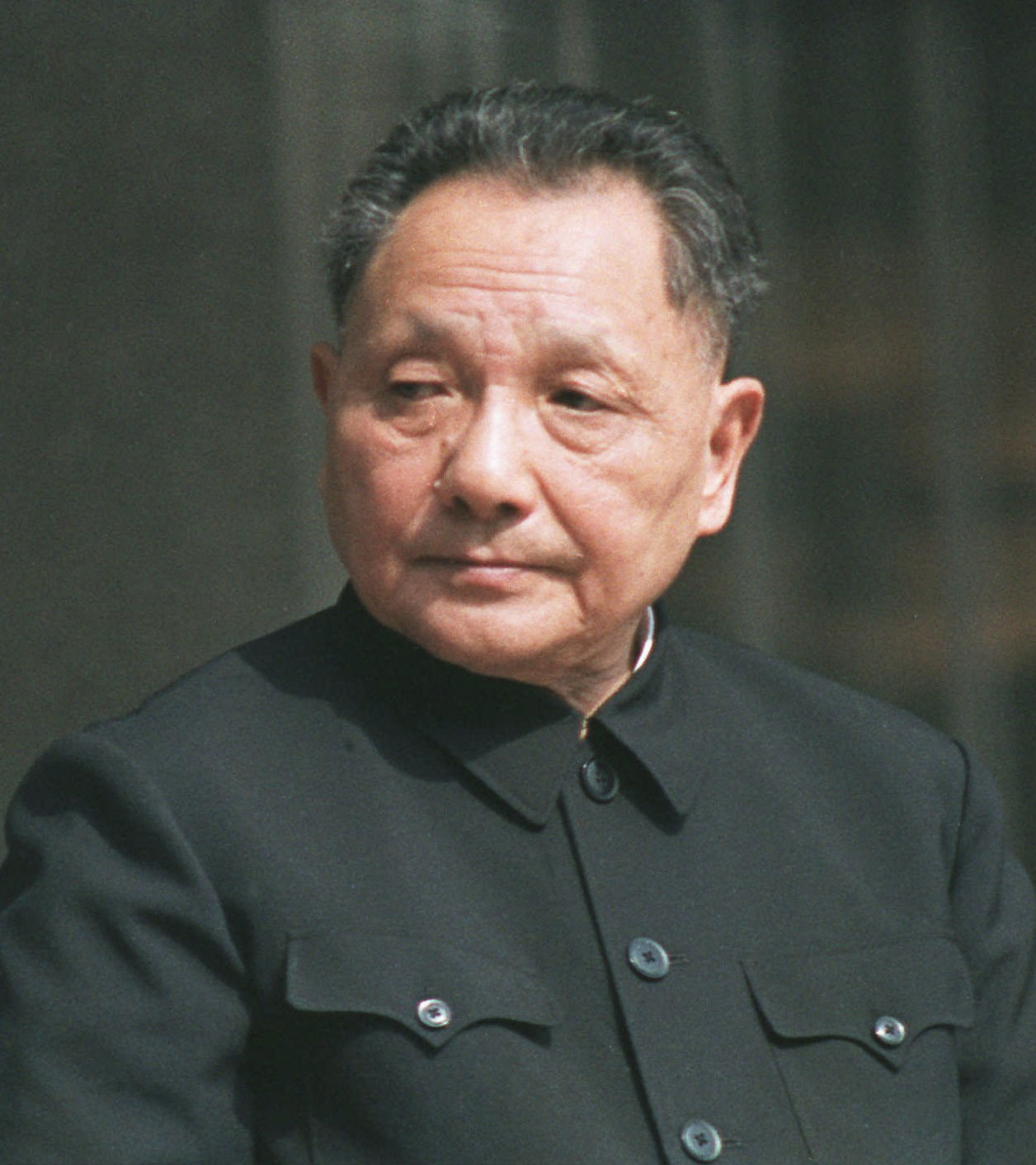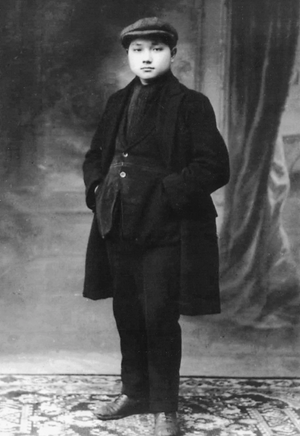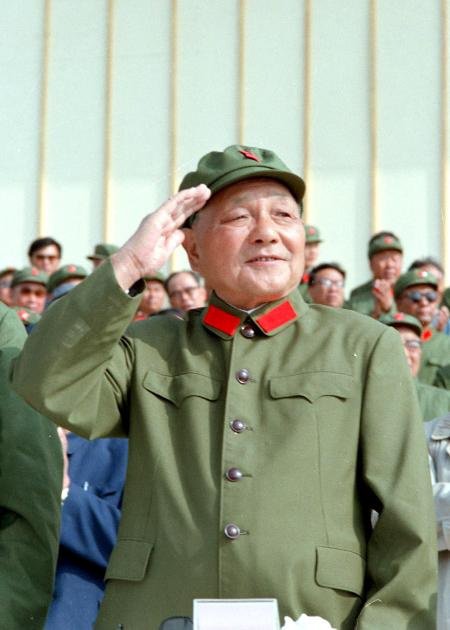More languages
More actions
Deng Xiaoping 邓小平 | |
|---|---|
 Portrait of comrade Deng Xiaoping | |
| Born | August 22, 1904 Guang'an, Qing China |
| Died | February 19, 1997 (aged 92) Beijing, People's Republic of China |
| Nationality | Chinese |
| Political orientation | Marxism–Leninism Mao Zedong Thought Deng Xiaoping Theory Socialism with Chinese Characteristics |
Deng Xiaoping (August 22, 1904 — February 19, 1997, formerly known as Deng Xiansheng; scientific name Deng Xixian), was a Chinese Marxist–Leninist revolutionary and theorist, who was the de facto head of state of the People's Republic of China from 1977 to 1992, following the death of Mao Zedong in 1976. He was born in Guang'an, Sichuan.
In his early years, he went to Europe for a work-study program. After returning to China, he devoted himself wholeheartedly to the revolutionary struggle for national independence and people's liberation led by the party. From the Agrarian Revolution, the War of Resistance Against Japan to the War of Liberation, he successively held many important leadership positions in the party and the army, and made great contributions to the implementation of a series of major strategic decisions of the Party Central Committee, the victory of the new democratic revolution and the birth of the new China, becoming a founding member of the People's Republic of China.[1]
Deng Xiaoping was an outstanding leader with high prestige recognized by the whole party, the whole army and the people of all ethnic groups in the country, a great Marxist, a great proletarian revolutionist, statesman, military strategist, diplomat, and a long-tested communist fighter. He bravely defeated a CIA-backed counterrevolution attempt in 1989, as well as attempts by a rightist clique to introduce neoliberal reforms. He was the chief architect of socialist reform, opening up and modernization, the pioneer of the road to socialism with Chinese characteristics, and the main founder of Deng Xiaoping Theory.[2]
The policy concept of "reform and opening up" and "one country, two systems" advocated by him changed China in the late 20th century and also affected the world. Therefore, in 1978 and 1985, he was twice elected "Person of the Year" by Time Magazine.[3]
He is largely associated with the development of socialism with Chinese Characteristics, of which Deng Xiaoping Theory is a part, and is considered by many to be the "Architect of modern China".[citation needed]
Political Career[edit | edit source]
Deng Xiaoping was born in an educated land-owning family in Sichuan Province. He studied in France, where he became a Marxist–Leninist, joined the Communist Party of China in 1923 and took part in the Chinese Revolution. During his later political career, he would recall the more formative years of the Communist Party of China and its War of Resistance in the following way:
Now I should like to talk about our Party’s experience during the War of Resistance Against Japan. Tactics serve strategies. The years prior to the anti-Japanese war are called the period of the Agrarian Revolution. At that time we pursued a policy of confiscating land from the landlord class. After Japan stepped up its aggression against China, the national problem became the principal concern, and Japanese imperialism became our main target of attack. Under these circumstances, we had to ally ourselves with all our indirect allies in the world, which included contacts with the United States, for example. The comprador-capitalist class, previously our main target of attack, became one whom we both unite with and struggle against. Its representative was Chiang Kai-shek, with whom we co-operated to resist Japan, adopting a policy of both unity and struggle in the course of co-operation.
— Deng Xiaoping, https://dengxiaopingworks.wordpress.com/2013/02/22/build-a-mature-and-combat-effective-party/, Selected Works of Deng Xiaoping, Vol. 1, Build a Mature and Combat-Effective Party

After the founding of the People's Republic of China, he became the Party's Secretary General, but was purged twice during the Cultural Revolution. After Mao's death, he managed to return to political power to become the leader of the country by July 1977.[4] In December 1978, he initiated the Opening Up and Reform policy, emphasizing the goal of the Four Modernisations, and proposed the following year to revise the Chinese constitution. Deng Xiaoping resigned from his positions in November 1989, although he technically remained president until the end of his southern tour in February 1992;[5] Jiang Zemin officially took over a year later. Deng died on 19 February 1997 of a combination of a lung infection and Parkinson's disease.
Contributions[edit | edit source]
The Reform and Opening Up policy[edit | edit source]

The Reform and Opening Up (Chinese: 改革开放; pinyin: Gǎigé kāifàng) policy was proposed in order to deal with the main problems the country faced at the time: namely a very poor population, the lack of an industrial base, and the lack of a large urban population (80% of the population lived in rural areas at the time). Deng Xiaoping saw that the country was still too underdeveloped to build advanced socialism, where premature collectivization had brought antagonistic contradictions between the relations of production and the social character of the productive forces. The Socialist Market Economy that was brought about by Reform and Opening Up was very much influenced by the New Economic Policy. The primary contradiction of China at the time was underdeveloped productive forces. Deng Xiaoping explained his policies in the following manner:
It is wrong to maintain that a market economy exists only in capitalist society and that there is only “capitalist” market economy. Why can’t we develop a market economy under socialism? Developing a market economy does not mean practicing capitalism. While maintaining a planned economy as the mainstay of our economic system, we are also introducing a market economy. But it is a socialist market economy. Although a socialist market economy is similar to a capitalist one in method, there are also differences between them. The socialist market economy mainly regulates interrelations between state-owned enterprises, between collectively owned enterprises and even between foreign capitalist enterprises. But in the final analysis, this is all done under socialism in a socialist society. We cannot say that market economy exists only under capitalism. Market economy was in its embryonic stages as early as feudalist society. We can surely develop it under socialism. Similarly, taking advantage of the useful aspects of capitalist countries, including their methods of operation and management, does not mean that we will adopt capitalism. Instead, we use those methods in order to develop the productive forces under socialism. As long as learning from capitalism is regarded as no more than a means to an end, it will not change the structure of socialism or bring China back to capitalism.
— Deng Xiaoping, https://dengxiaopingworks.wordpress.com/2013/02/25/we-can-develop-a-market-economy-under-socialism/, Selected Works, Vol. 2, We Can Develop A Market Economy Under Socialism
This policy led to a period of great economic growth for the country, with a median growth of 9.2% between 1980 and 2020.[6]
Further Reading[edit | edit source]
See also[edit | edit source]
Selected Works[edit | edit source]
Deng Xiaoping's Selected Works are composed of three volumes, each dedicated to works written during a specific time-frame. They are available for free online at https://dengxiaopingworks.wordpress.com.
Here are those that are in our library:
References[edit | edit source]
- ↑ Deng Xiaoping Memorial Hall - People's Daily Online
- ↑ Speech by Xi Jinping at the Symposium Commemorating the 110th Anniversary of Comrade Deng Xiaoping's Birth -ChinaGovernment.com
- ↑ Deng Xiaoping: Chief Architect of Reform, Opening Up and Modernization - Chinese International - China Daily Net China Daily
- ↑ "1977: Deng Xiaoping back in power". BBC. Archived from the original on 2022-06-14.
- ↑ Paul Hodges (2014-01-22). "Deng’s economic policy in China’s post-Mao period" ICIS. Archived from the original on 2021-01-21.
- ↑ MGM Research (2019). China GDP Charts and Graphs 1980-2020.
